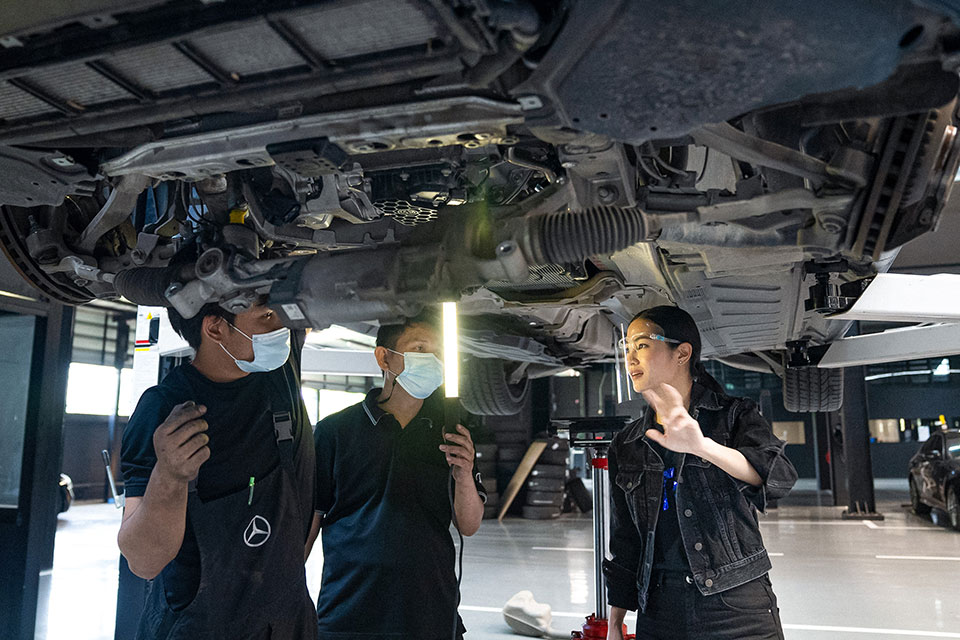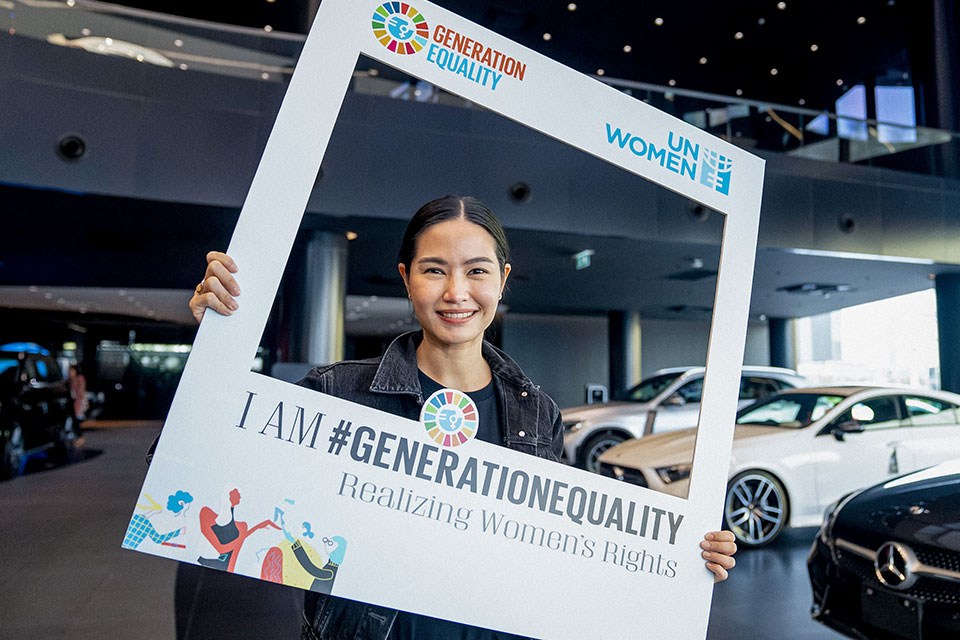This is what leadership looks like: Meet Jittirat Tantasirin, creating opportunities for women in the automotive industry in Thailand
Date:
Author: Bovornpong Vathanathanakul


Watch the interview on YouTube
“A true leader creates leaders,” says Jittirat Tantasirin, CEO of ATTA Autohaus, one of Thailand’s authorized Mercedes-Benz dealers.
Fast facts
- Women’s full and effective participation and decision-making in public life, as well as the elimination of violence, is critical in supporting their empowerment in other sectors, including the private sector, media, arts and sport.
- Progress in increasing women’s representation in public life and decision-making has been too slow. Only 22 countries are headed by a woman, only 3 countries have 50 percent or more women in parliament, and only 7.4 per cent of Fortune 500 companies are run by women.
- Violence against women in political and public life stops women from accessing their power and silences their voices in decision-making, with online abuse and cyberbullying increasingly common.
- Gender quotas increase women’s representation in legislatures and in private sector, when they are well designed and effectively implemented.
- Everyone suffers from the under-representation of women. One study of COVID-19 task forces from 87 countries found only 3.5% had gender parity. For effective COVID-19 response and recovery, women must be part of decision-making so that policies and budgets meet everyone’s needs and build back better.
For more data on women’s leadership, see the UN Secretary-General’s Report
As the COVID-19 pandemic spread across the world, businesses scrambled to adapt to unprecedented economic and social consequences of the crisis. The automotive industry was no exception – with lockdowns and “stay home” orders in effect in many parts of the world still, car showrooms had to go digital. Tantasirin and her team leveraged technology to revolutionize retail sales models and expand women’s place in the industry.
In March 2020, as the pandemic intensified and a nationwide curfew came into place, Tantasirin launched the country’s first-ever ‘Digital Smart Space’ showroom, designed to be a contactless customer experience. The dealership’s array of high-tech services now includes the ATTA Bot, an on-demand personal service assistant that independently moves and wirelessly transmits information to customers on available cars and pricing options. The robot can even help customers schedule a test drive or remote consultation.
Lifting women up, while adapting to new ways of business
“From automation to virtual reality and robotics, disruptive technologies are helping us cope with the sweeping and immediate impact of COVID-19, like how our ATTA Bot is redefining the car-buying process with virtual user guides and showroom consultation. The pandemic has shifted consumer priorities towards health and safety. [The technologies] are also helping our female sales personnel feel safe, respected and focused on serving customers without the risk of sexual harassment,” says Tantasirin.
Sexual harassment against women in public spaces is a persistent problem in Thailand, as in other parts of the world, and rampant in the automotive and sales industry, where women face harassment, groping and intimidation by clients, coworkers and supervisors. An online survey conducted in June 2019 by UK-based market research firm YouGov found that one in five Thais (21 per cent out of 1,107 surveyed) experienced sexual harassment. Most experiences of sexual harassment took place in public places, such as public transportation (27 per cent), nightclubs (18 per cent), schools and universities (17 per cent) and other public places (29 per cent).

While Thailand ranks 2nd globally for women’s representation in senior management, there is growing recognition that its automotive industry has shown little progress in gender diversity among executive teams. Tantasirin developed a passion for women’s rights early on, as she saw her mother (Penjan Tantasirin), one of the first female board members of Benz Talingchan, deal with discrimination and stereotypes in her job.
“It takes a lot to be successful in this sector. While women’s representation on boards is slowly improving, a culture of mistrust in women’s ability to lead effectively endures, explains Tantasirin “[My mother] was the only woman on the board, always having her ideas questioned and doubted in an industry [where men are usually] in leadership positions. These deep-seated biases are difficult to change.”
The Thai government has predicted that as many as 700,000 high-skilled workers will be needed in the automotive industry by 2022 as automation changes jobs and the way companies do business. Today, as the CEO of ATTA Autohaus, Tantasirin sees this as an opportunity to build the female talent pipeline, move more women into higher positions and upskill promising employees with the skills they will need to succeed and become leaders. As a result, she has introduced specific measures to foster women’s empowerment and gender-inclusive workplace culture through recruitment strategies, performance-based promotion, and a ‘Holacracy’ management approach, along with mentoring and counselling support that promotes employee emotional health and well-being. The company also reports that 60 per cent of its board members are currently female.
Investing in women’s leadership is better for business
“Women are a source of underutilized talent. Companies that make the right investments now can build an enduring business beyond the coronavirus crisis. It’s all about how quickly companies can [leverage] untapped female talent and help them become experts at what they do,” Tantasirin highlights.
“Creating a gender-inclusive workplace is important for me, because diversity and variety allows for creating better customer experience.”
One of the women’s empowerment initiatives that she is most proud of leading is called #She’sMercedes – a global initiative of Mercedes-Benz that she has localized to help inspire, connect and empower women who aim to be change-makers. Since the opening of her dealership, the initiative has already forged partnerships with seven high-profile Thai women entrepreneurs who have shared inspirational stories about how they are each leading a zero-emission lifestyle and tackling environmental challenges. Tantasirin says the next phase of her project will aim to create a space for dialogue for women leaders to co-create sustainability solutions and share how they are adapting their businesses and supply chains to the “new normal” since the pandemic.
“The #She’sMercedes initiative [creates a space for] women to talk about opportunities, learn and advocate for what they believe in,” says Tantasirin. “We really need to ensure that women have the resources they need to get through this difficult period and realize their full potential. Creating a gender-inclusive workplace is important for me, because diversity and variety allows for creating better customer experience.”
Tantasirin, who won UN Women’s award for Gender-inclusive Workplace in Thailand in December 2020, currently prioritizes aligning her business with the Women’s Empowerment Principles (WEPs). Under a UN Women programme, WeEmpowerAsia, funded by the European Union, her company is taking steps to implement the WEPs. The Asia-Pacific region now has over 900 signatories to the WEPs and to date, 29 companies in Thailand have signed on.
For more stories like this, visit our In Focus: UN Commission on the Status of Women (CSW65)